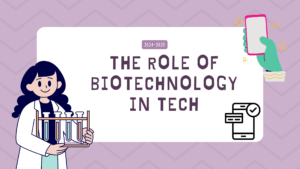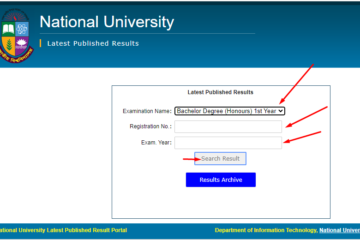The Role of Biotechnology in Tech: Advancements, Applications, and Ethical Considerations
Introduction:
In the consistently developing scene of innovation, biotechnology has arisen as a strong power, upsetting enterprises and reshaping the manner in which we approach logical and clinical difficulties. This convergence of science and innovation has prepared for earth shattering progressions, imaginative applications, and, unavoidably, moral contemplations that request cautious investigation. This article digs into the multi-layered job of biotechnology in tech, investigating its new walks, different applications, and the moral quandaries that go with its quick advancement.
Progressions in Biotechnology:
Late years have seen astounding progressions in biotechnology, driven by forward leaps in hereditary designing, engineered science, and other state of the art disciplines. CRISPR-Cas9, a progressive quality altering instrument, has empowered exact change of DNA groupings, offering phenomenal command over hereditary material. This has sweeping ramifications, from expected solutions for hereditary sicknesses to the production of hereditarily changed living beings with upgraded qualities.
Engineered science, one more outskirts in biotechnology, includes the plan and development of natural substances for explicit purposes. Scientists are bridling the force of manufactured science to design organisms that produce biofuels, drugs, and even materials like biodegradable plastics. These headways highlight the extraordinary capability of biotechnology in tending to worldwide difficulties.
Applications Across Enterprises:
Biotechnology’s effect reaches out across different enterprises, with applications going from medication to farming and natural preservation.
Medication and Medical services:
Biotechnology has reformed clinical diagnostics, therapeutics, and customized medication. Accuracy medication, directed by genomic data, takes into account custom fitted treatment plans in view of a person’s hereditary cosmetics. Moreover, headways in biopharmaceuticals, like monoclonal antibodies and quality treatments, have extended treatment choices for beforehand hopeless illnesses.
Agribusiness:
Biotechnology assumes a critical part in farming through hereditarily changed (GM) crops. GM crops are designed to have helpful attributes like protection from vermin, illnesses, and cruel ecological circumstances. This improves crop yields, diminishes the requirement for compound pesticides, and adds to worldwide food security.
Natural Preservation:
Biotechnology is adding to natural manageability by offering answers for contamination and waste administration. Compounds created by hereditarily designed organisms can separate contaminations, and microorganisms are being tackled to tidy up oil slicks. Besides, biotechnology is propelling the improvement of feasible options in contrast to customary materials, decreasing the ecological effect of different enterprises.
Moral Contemplations:
The quick movement of biotechnology brings up moral issues that request cautious thought and guideline.
Quality Altering and Architect Children:
The capacity to alter qualities delivers the chance of “architect children,” where hereditary characteristics can be chosen or changed. Moral worries encompassing the expected abuse of this innovation, for example, making people with upgraded physical or scholarly abilities, brief conversations about the requirement for mindful and moral utilization of quality altering apparatuses.
Security and Hereditary Data:
The far reaching utilization of hereditary data in medical care and exploration raises worries about security. Shielding hereditary information from abuse and unapproved access is pivotal to guarantee people’s independence and safeguard against potential separation in view of hereditary inclinations.
Ecological and Cultural Effect:
The arrival of hereditarily adjusted organic entities into the climate brings up issues about their drawn out influence on biological systems. Finding some kind of harmony between the advantages of biotechnology and potential natural dangers is fundamental to guarantee reasonable and mindful turn of events.
Developing Outskirts: Future Applications and Difficulties
Future Uses of Biotechnology in Tech:
As biotechnology keeps on propelling, its future applications hold the commitment of much more significant effects across different spaces.
Neuroscience and Cerebrum PC Connection points:
Biotechnology is taking critical steps in understanding and controlling the complexities of the human mind. Arising advances, like cerebrum PC interfaces, could change correspondence for people with loss of motion and open new boondocks in human-machine association.
Microbiome Designing:
The human microbiome, comprising of trillions of microorganisms living in and on our bodies, assumes a significant part in wellbeing. Biotechnological mediations to design the microbiome could prompt leap forwards in treating illnesses connected with stomach wellbeing and digestion, offering customized answers for people.
Biocomputing and Manufactured Life:
Specialists are investigating the chance of utilizing organic substances to perform registering errands. Manufactured science, joined with propels in DNA registering, holds the possibility to make living PCs that can cycle data in manners recently thought unimaginable with conventional electronic frameworks.
Moral Difficulties Not too far off:
As we adventure into these strange domains, moral difficulties become considerably more complicated, requiring continuous exchanges and vigorous administrative structures.
Arising Bioweapons Danger:
The expected abuse of biotechnological headways for the making of bioweapons raises worries about worldwide security. Worldwide collaboration and rigid guidelines are pivotal to forestall the turn of events and organization of hurtful natural specialists.
Social Disparities and Admittance to Biotechnology:
The advantages of biotechnology should be appropriated evenhandedly to abstain from compounding existing social imbalances. Guaranteeing far reaching admittance to state of the art medicines and innovations is a squeezing moral thought, especially in medical care.
Long haul Natural Effect:
As hereditarily altered organic entities and engineered science applications become more common, evaluating and moderating their drawn out natural effect is fundamental. Reasonable practices and extensive gamble evaluations are basic to keep away from unseen side-effects.
Joint effort and Moral Administration:
Tending to these difficulties requires cooperative endeavors among researchers, policymakers, ethicists, and general society. Open and straightforward correspondence channels should be kept up with to work with moral administration systems that stay up with innovative progressions.
Interdisciplinary Coordinated effort:
Uniting specialists from assorted fields — science, innovation, morals, regulation — is pivotal for creating thorough rules and moral systems. Interdisciplinary joint effort guarantees an all encompassing way to deal with tending to the diverse difficulties presented by biotechnological progressions.
Public Commitment and Schooling:
Informed public talk is vital for shape approaches that reflect cultural qualities and concerns. Training drives can enable people to settle on informed conclusions about biotechnological improvements, cultivating a feeling of obligation and moral mindfulness.
Worldwide Administrative Norms:
Given the worldwide idea of biotechnological examination and applications, the improvement of global administrative principles is foremost. This guarantees consistency and responsibility, forestalling potential “bioethics asylums” where exploration could be led without satisfactory moral oversight.
Biotechnology in Tech
Biotechnology’s part in tech remains at the cutting edge of logical advancement, holding massive potential to address squeezing difficulties confronting humankind. As we explore this developing scene, a sensitive harmony among development and moral obligation is fundamental. By cultivating joint effort, guaranteeing impartial access, and laying out strong administration structures, we can expand the advantages of biotechnology while defending against likely traps. The excursion into the eventual fate of biotechnology in tech is an astonishing one, and its prosperity lies in our aggregate obligation to mindful investigation and moral thought.
Conclusion:
The job of biotechnology in tech is unquestionably groundbreaking, offering phenomenal open doors for logical and mechanical advancement. Be that as it may, as we explore this unfamiliar domain, it is basic to approach biotechnological headways with a basic eye, tending to moral contemplations and encouraging dependable development. Finding some kind of harmony between logical investigation and moral obligation will be vital to bridling the maximum capacity of biotechnology to improve mankind and the planet.


.gif)
.gif)
.gif)


